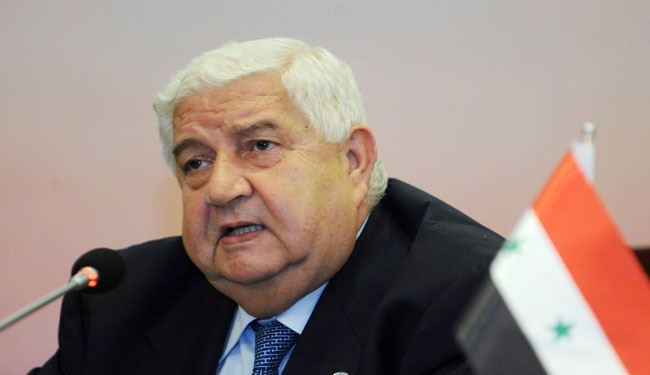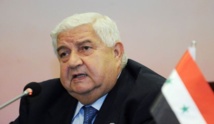"Syria will attend Geneva II based on the exclusive right of the Syrian people to choose their political future, to choose their leaders and to reject all forms of external intervention," Muallem said.
"The dialogue will take place between Syrians," he added, rejecting interference from outside.
He also said that all statements about the future of the country, particularly "the one from London," were "infringements on the rights of the Syrian people" and "preconditions to the dialogue before it has even started."
That was a reference to the October 22 meeting of the "Friends of Syria" group of countries, key backers of the Syrian opposition.
At the meeting, Western and Arab powers agreed with opposition heads that Assad had no future role to play in the country.
Brahimi himself insisted that the Geneva talks would be "between the Syrian parties" and that only Syrians would decide their future, SANA reported.
He added that there was an agreement on "the importance of ending the violence, terrorism and respecting Syrian sovereignty," according to SANA.
As Brahimi presses his tour to drum up backing for the talks in Geneva, its prospects remain in doubt, with Syria's increasingly fractured rebels having yet to say whether they will attend.
The main opposition National Coalition has said it will refuse to attend talks unless Assad's resignation is on the table -- a demand rejected by Damascus.
And several rebel groups have even warned that anyone who attends will be considered a traitor.
Assad himself has cast doubt on the possibility of talks, saying he will not negotiate with any group tied to the rebels or to foreign states.
Vice premier sacked
With prospects dimming of Geneva II taking place next month as hoped, Assad sacked his vice premier, Qadri Jamil, for being absent without leave and carrying out unauthorised meetings abroad.
The comes after Jamil met with the US pointman for Syria Robert Ford in Geneva on Saturday to discuss the proposed peace talks.
The official SANA news agency said Jamil was sacked after an "absence without authorisation from his post" as well as "activities and meetings outside the country without authorisation from the government."
State Department spokeswoman Jen Psaki said Ford met the "Syrian deputy prime minister, who ... led a government-affiliated internal opposition party and who has now reportedly departed that post."
"Ambassador Ford stressed that we must all work for a political solution on the lines of Geneva, that Assad and the inner circle have lost legitimacy and must go."
Jamil himself told Lebanon-based satellite channel Al-Mayadeen that he planned to return to Damascus and defended his meetings abroad.
"Our meetings with international parties to halt the bloodbath in Syria are legitimate," he said.
More than 115,000 people are estimated to have been killed in Syria's 31-month conflict.
In the latest measure of Syria's disintegration, the World Health Organisation confirmed a cluster of polio cases in the northeastern province of Deir Ezzor, all of them in children under the age of two.
Before the war broke out, around 95 percent of all children were vaccinated, but since then some 500,000 children have gone without, the United Nations says.
On the battlefield, Kurdish fighters advanced across the northeast after seizing a crossing on the Iraqi border from jihadists over the weekend, according to the Syrian Observatory for Human Rights, a Britain-based group.
The Kurds had seized two villages in Hasakeh province and surrounded a rebel brigade that is part of the Western-backed Free Syrian Army, forcing it to surrender an array of weapons, including a tank.
As the conflict has grown increasingly muddled, the Kurds have fought both government forces and other rebel groups in a bid to carve out an autonomous zone modelled on the Kurdish region of Iraq.
Jihadists from the Islamic State of Iraq and the Levant have sought to control the border to facilitate the flow of fighters and arms, as it launched attacks in both Iraq and Syria.
---------------------------------------------------------------------------------------------------------------
"The dialogue will take place between Syrians," he added, rejecting interference from outside.
He also said that all statements about the future of the country, particularly "the one from London," were "infringements on the rights of the Syrian people" and "preconditions to the dialogue before it has even started."
That was a reference to the October 22 meeting of the "Friends of Syria" group of countries, key backers of the Syrian opposition.
At the meeting, Western and Arab powers agreed with opposition heads that Assad had no future role to play in the country.
Brahimi himself insisted that the Geneva talks would be "between the Syrian parties" and that only Syrians would decide their future, SANA reported.
He added that there was an agreement on "the importance of ending the violence, terrorism and respecting Syrian sovereignty," according to SANA.
As Brahimi presses his tour to drum up backing for the talks in Geneva, its prospects remain in doubt, with Syria's increasingly fractured rebels having yet to say whether they will attend.
The main opposition National Coalition has said it will refuse to attend talks unless Assad's resignation is on the table -- a demand rejected by Damascus.
And several rebel groups have even warned that anyone who attends will be considered a traitor.
Assad himself has cast doubt on the possibility of talks, saying he will not negotiate with any group tied to the rebels or to foreign states.
Vice premier sacked
With prospects dimming of Geneva II taking place next month as hoped, Assad sacked his vice premier, Qadri Jamil, for being absent without leave and carrying out unauthorised meetings abroad.
The comes after Jamil met with the US pointman for Syria Robert Ford in Geneva on Saturday to discuss the proposed peace talks.
The official SANA news agency said Jamil was sacked after an "absence without authorisation from his post" as well as "activities and meetings outside the country without authorisation from the government."
State Department spokeswoman Jen Psaki said Ford met the "Syrian deputy prime minister, who ... led a government-affiliated internal opposition party and who has now reportedly departed that post."
"Ambassador Ford stressed that we must all work for a political solution on the lines of Geneva, that Assad and the inner circle have lost legitimacy and must go."
Jamil himself told Lebanon-based satellite channel Al-Mayadeen that he planned to return to Damascus and defended his meetings abroad.
"Our meetings with international parties to halt the bloodbath in Syria are legitimate," he said.
More than 115,000 people are estimated to have been killed in Syria's 31-month conflict.
In the latest measure of Syria's disintegration, the World Health Organisation confirmed a cluster of polio cases in the northeastern province of Deir Ezzor, all of them in children under the age of two.
Before the war broke out, around 95 percent of all children were vaccinated, but since then some 500,000 children have gone without, the United Nations says.
On the battlefield, Kurdish fighters advanced across the northeast after seizing a crossing on the Iraqi border from jihadists over the weekend, according to the Syrian Observatory for Human Rights, a Britain-based group.
The Kurds had seized two villages in Hasakeh province and surrounded a rebel brigade that is part of the Western-backed Free Syrian Army, forcing it to surrender an array of weapons, including a tank.
As the conflict has grown increasingly muddled, the Kurds have fought both government forces and other rebel groups in a bid to carve out an autonomous zone modelled on the Kurdish region of Iraq.
Jihadists from the Islamic State of Iraq and the Levant have sought to control the border to facilitate the flow of fighters and arms, as it launched attacks in both Iraq and Syria.
---------------------------------------------------------------------------------------------------------------









 Home
Home Politics
Politics











